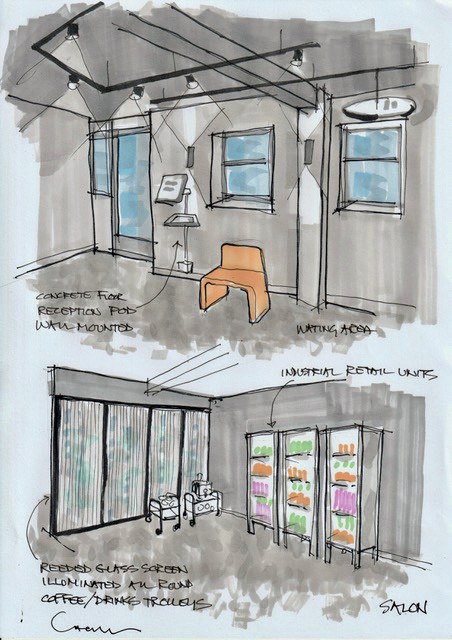THE DOS AND DON’TS OF HIRING A CONTRACTOR
If you’re thinking about fitting out a salon or renovating in the near future, read these words of warning from salon designer Charlie Hearn first
Charlie Hearn has had a design business for 40 years, and for the last 24 years he has specialised in the hair and beauty industry working with clients such as Mark Woolley, Lisa Shepherd and L’Oréal Professionnel Paris to mention a few. Here he shares his top tips for hiring a salon contractor.
“Fitting out a hair salon isn't an easy task and if not done properly can cause you stress and financial difficulties. Fortunately these are few and far between, however it did happen to me recently, so I felt I would share my thoughts on what not to do when fitting out a salon.
Firstly, depending on the size of the fit-out, get a good designer in. Always look for someone who has a portfolio of successful salons. This is the first key to a successful project. Secondly, use a reputable contractor, preferably one that you know and trust. Having used many contractors over the years I have narrowed these down to three go-to contractors for all my projects. If you don’t know a contractor and have to find one – do due diligence.
I did a project recently where my client had to vacate his existing salon on a fixed date. None of my preferred contractors were able to take on the shop fit so I had to find one who could work to this date. I was recommended a contractor and we met, discussed the project and the timescales, and I asked to see examples of shop fits they had done. They only provided one salon which was pretty simple however, as we were working to a tight schedule, I took the recommendation at face value.
This was my first mistake! Never take somebody's word. Visit previous fit outs, speak to previous clients and check the contractor's records at Companies House. This contractor, despite all the assurances, missed three handover dates. As we had committed, we kept giving him the benefit of the doubt. This was my second mistake! As soon as deadlines get missed and handovers don’t happen – act quickly and positively. When the project became five weeks late we took the decision to terminate the contract. This can be a minefield so we engaged an independent, qualified Quantity Surveyor to measure and value the works done and prepare competent documents to justify our case. Keep copies of emails, WhatsApps and dated photos to show a timeline of progress and missed dates. Also, always keep contemporaneous notes of any meetings and send these to the contractor.

When it comes to tenders and quotations, the contractor will no doubt have conditions attached, all to their advantage. Read them carefully and add your own conditions. Agree a fixed handover date and a schedule of works showing first fix, second fix, finishing and snagging in writing and, if possible, insist on a penalty clause if they run over the agreed schedule. Agree a payment schedule, but do not make advance payments. It is normal practice now to make a first payment after strip out, but this should be no more than 20%, another up to 50% mid-way through contract and then up to 90% on finished handover. Retain 10% for a Defects Liability period agreed in advance. If possible have the works done under a JCT Small Works Contract but that can be difficult for a layperson to understand, hence the need for a good designer to help you decipher it.
Finally, make sure you have the funds in place before works start. Add 10% contingency to the tender price (don’t tell the contractor though!). Do not overstretch yourself financially. This might seem like overkill but it will save you in the long run. Be proactive - you are the client, this is your business and this is your life. And all is well that ended well with the shop fit in question. We ended up calling in favours, particularly from one of my go-to shop fitters, and I’m pleased to say that the salon is now open and looking fabulous.”
Charlie's Checklist
✔ DO choose your contractor carefully
✔ DO make sure you do background checks on their ability to handle the contract, not only to a timescale but to an acceptable standard of finish
✔ DO speak to their previous clients, if possible visit previous projects
✔ DON’T take recommendations at face value
✔ DO check their financial background and their Employers’ and Public Liability insurances
✔ DON’T let contracts drift, otherwise delays to opening could cost you loss of profit, paying for staff with nowhere to go,paying for rent and rates for premises that are unusable and not earning money